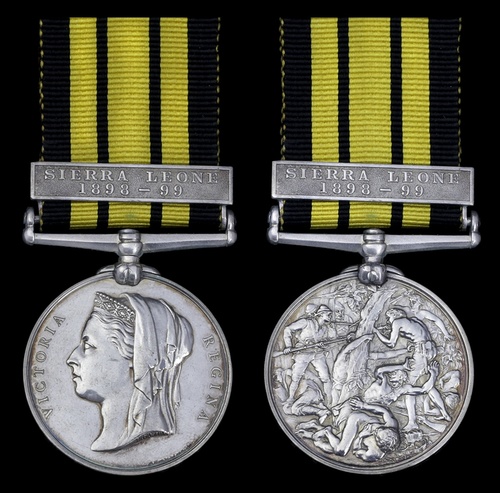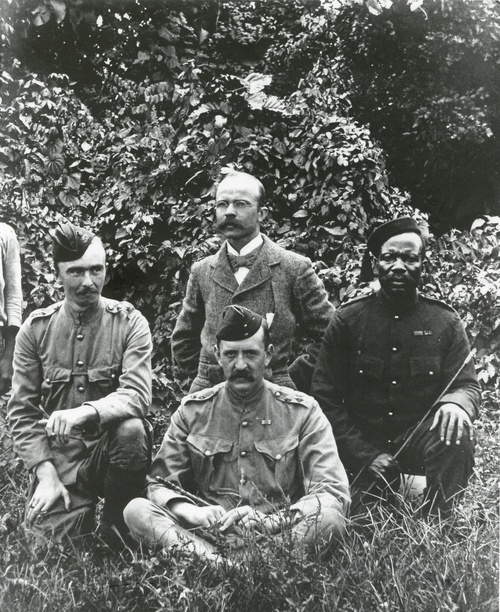Auction: 19002 - Orders, Decorations and Medals
Lot: 42
An exceptional East and West Africa Medal awarded to Hon. Lieutenant-Colonel H. G. Warren, a District and Special Commissioner, late Limerick City Artillery, and long-served officer of the Sierra Leone Frontier Police, who died of blackwater fever in Karene District in February 1919
As a Captain and Inspector in the Sierra Leone Frontier Police, he saw extensive action in the 1898-99 operations, not least in an expedition into Kwaia in April 1898, when he and his men inflicted heavy loss on the rebels; he is also credited with arresting the rebel leaders Pa Nembana and Bai Kompah and was among those who fought their way through to the besieged town of Panguma in June 1898
East and West Africa 187-1900, 1 clasp, Sierra Leone 1898-99 (Capt. H. G. Warren, S. Leone F.P.C.), good very fine
Harold Galwey Montague Warren was born on 20 July 1874, the only son of John Augustus Warren, J.P. Appointed a 2nd Lieutenant in the Limerick City Artillery in March 1892, young Harold was advanced to Lieutenant in March 1894 and to Captain in September 1896.
The Hut Tax War 1898-99
In August 1897, Warren was seconded to the Sierra Leone Frontier Police as an Inspector, to which duties he added those of Justice of the Peace on his arrival at Freetown. And with the advent of the hut tax rebellion in the following year, he assumed the local rank of Captain. He subsequently saw extensive action under Major E. d'H. Fairtclough, he and his party of 50 Frontier Police inflicting heavy loss on rebel war-boys in an expedition into Kwaia in April 1898; official reports reveal at least 14 actions fought over a fortnight.
Warren was also responsible for apprehending the rebel leaders Pa Nembana and Bai Kompah, the latter - 'a big, old man' - putting up a determined struggle and necessitating a shove from Warren's knee.
Further sources credit Warren as having participated in the operations to relieve the town of Panguma in late June 1898. The defenders, under Captain J. E. C. Blakeney, had endured nearly two months of siege. Food and ammunition were running short and casualties were mounting, the latter cared for as best as possible by Dr. O. Horrocks.
One relief column having failed to get through in the first week of June, another, larger force departed from Kwalu on the 12th, Warren once again coming under the command of Major E. d'H. Fairtclough. The force comprised 75 hand-picked Frontier Police and native gunners from the Sierra Leone Royal Artillery, with a 7-pounder, 15 armed court messengers and about 300 'Friendlies'.
When within three miles of Gagboro the enemy opened fire from an ambush. The relief column repelled them and, charging on, drove them out of three rows of stockades. Progress was slow, however, as the roads were frequently obstructed and the bush on either side swarming with rebel tribesmen, who continued to do all within their power to inflict casualties. At Dodo, the rebels launched a major attack but they were beaten back by Warren's disciplined ranks of Frontier Police and the 7-pounder. Finally, at 11 a.m. on 23 June, the relief column reached Panguma.
Five days later, after much preparation, the force evacuated the town and took a different route back to Kwalu. It was a heavily contested return journey, for the column frequently encountered strongly defended stockades which were held with great determination by the rebels. All were taken, however, and the column continued onward to Yomundu. Here, on 6 July, a major action was fought, an action that would turn the tide of war. Three storming parties advanced on the town's stockades, with valuable support from the 7-pounder, and a severe hand-to-hand fight ensued. Much to the fore, the Frontier Police ended up killing three rebel chiefs and 115 of their followers.
Warren's name subsequently appeared on a Colonial Office list of officers who had distinguished themselves during the disturbances.
Subsequent career
In the summer of 1900, Warren acted as District Commissioner of the Panguma District and, at the end of the same year, acted as Inspector-General of the Frontier Police Force. He was also appointed a Captain in the Sierra Leone Battalion of the West African Frontier Force, of which unit he became Adjutant and then as Acting C.O. for a period from May 1902. In February 1903, he was appointed a District Commissioner in the Protectorate of Sierra Leone, in addition to Presiding Judge.
Meanwhile, he remained seconded to the Militia in the U.K. and was promoted to Major in the Limerick City Artillery in February 1904. When the Militia in the United Kingdom ceased four years later, Warren was transferred to the Limerick City Royal Field Artillery (Special Reserve) and was granted the honorary rank of Lieutenant-Colonel in November 1909. Shortly afterwards, he transferred to the Reserve of Officers.
Back in West Africa, Warren was appointed First Class District Commissioner in January 1911 and, in February 1913, a Special Commissioner of the Special Commission Court. Sadly, however, he died of blackwater fever at Batkanu, Karene District, on 6 February 1919. He was aged 44; sold with an extensive file of copied research.
Subject to 20% VAT on Buyer’s Premium. For more information please view Terms and Conditions for Buyers.
Sold for
£600
Starting price
£550







